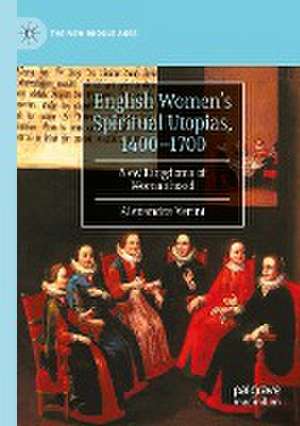English Women’s Spiritual Utopias, 1400-1700: New Kingdoms of Womanhood: The New Middle Ages
Autor Alexandra Verinien Limba Engleză Paperback – 8 iun 2023
| Toate formatele și edițiile | Preț | Express |
|---|---|---|
| Paperback (1) | 457.56 lei 3-5 săpt. | +14.93 lei 7-13 zile |
| Springer International Publishing – 8 iun 2023 | 457.56 lei 3-5 săpt. | +14.93 lei 7-13 zile |
| Hardback (1) | 528.13 lei 6-8 săpt. | |
| Springer International Publishing – 7 iun 2022 | 528.13 lei 6-8 săpt. |
Din seria The New Middle Ages
-
 Preț: 347.96 lei
Preț: 347.96 lei - 15%
 Preț: 524.70 lei
Preț: 524.70 lei - 20%
 Preț: 629.09 lei
Preț: 629.09 lei - 20%
 Preț: 690.00 lei
Preț: 690.00 lei - 18%
 Preț: 782.42 lei
Preț: 782.42 lei - 20%
 Preț: 566.93 lei
Preț: 566.93 lei - 8%
 Preț: 537.27 lei
Preț: 537.27 lei - 9%
 Preț: 626.76 lei
Preț: 626.76 lei - 20%
 Preț: 629.00 lei
Preț: 629.00 lei - 15%
 Preț: 636.80 lei
Preț: 636.80 lei - 8%
 Preț: 563.61 lei
Preț: 563.61 lei -
 Preț: 303.51 lei
Preț: 303.51 lei -
 Preț: 389.70 lei
Preț: 389.70 lei -
 Preț: 390.63 lei
Preț: 390.63 lei -
 Preț: 380.45 lei
Preț: 380.45 lei -
 Preț: 385.62 lei
Preț: 385.62 lei -
 Preț: 390.25 lei
Preț: 390.25 lei -
 Preț: 385.25 lei
Preț: 385.25 lei - 5%
 Preț: 712.81 lei
Preț: 712.81 lei - 15%
 Preț: 640.06 lei
Preț: 640.06 lei -
 Preț: 398.15 lei
Preț: 398.15 lei -
 Preț: 393.35 lei
Preț: 393.35 lei - 15%
 Preț: 697.97 lei
Preț: 697.97 lei - 18%
 Preț: 725.13 lei
Preț: 725.13 lei - 18%
 Preț: 724.17 lei
Preț: 724.17 lei -
 Preț: 388.90 lei
Preț: 388.90 lei - 15%
 Preț: 698.30 lei
Preț: 698.30 lei -
 Preț: 388.72 lei
Preț: 388.72 lei -
 Preț: 387.96 lei
Preț: 387.96 lei - 15%
 Preț: 579.20 lei
Preț: 579.20 lei -
 Preț: 391.40 lei
Preț: 391.40 lei -
 Preț: 386.39 lei
Preț: 386.39 lei -
 Preț: 387.38 lei
Preț: 387.38 lei -
 Preț: 384.48 lei
Preț: 384.48 lei - 18%
 Preț: 726.69 lei
Preț: 726.69 lei -
 Preț: 385.08 lei
Preț: 385.08 lei - 15%
 Preț: 639.14 lei
Preț: 639.14 lei -
 Preț: 388.72 lei
Preț: 388.72 lei -
 Preț: 387.20 lei
Preț: 387.20 lei -
 Preț: 389.11 lei
Preț: 389.11 lei - 15%
 Preț: 640.24 lei
Preț: 640.24 lei - 15%
 Preț: 499.92 lei
Preț: 499.92 lei - 15%
 Preț: 640.37 lei
Preț: 640.37 lei - 15%
 Preț: 641.71 lei
Preț: 641.71 lei -
 Preț: 384.70 lei
Preț: 384.70 lei - 15%
 Preț: 694.37 lei
Preț: 694.37 lei
Preț: 457.56 lei
Preț vechi: 551.28 lei
-17% Nou
Puncte Express: 686
Preț estimativ în valută:
87.55€ • 91.41$ • 72.46£
87.55€ • 91.41$ • 72.46£
Carte disponibilă
Livrare economică 14-28 martie
Livrare express 28 februarie-06 martie pentru 24.92 lei
Preluare comenzi: 021 569.72.76
Specificații
ISBN-13: 9783031009198
ISBN-10: 3031009193
Pagini: 223
Ilustrații: XIII, 223 p. 6 illus.
Dimensiuni: 148 x 210 x 19 mm
Greutate: 0.29 kg
Ediția:1st ed. 2022
Editura: Springer International Publishing
Colecția Palgrave Macmillan
Seria The New Middle Ages
Locul publicării:Cham, Switzerland
ISBN-10: 3031009193
Pagini: 223
Ilustrații: XIII, 223 p. 6 illus.
Dimensiuni: 148 x 210 x 19 mm
Greutate: 0.29 kg
Ediția:1st ed. 2022
Editura: Springer International Publishing
Colecția Palgrave Macmillan
Seria The New Middle Ages
Locul publicării:Cham, Switzerland
Cuprins
Chapter 1: Mirrors of our Lady: Utopia in the Medieval Convent.- Chapter 2: These Most Afflicted Sisters: Old and New Futures in Exiled English Convents.- Chapter 3: Not Yet: Aspirational Women’s Communities Beyond the Convent.- Chapter 4: Convents of Pleasure: English Women’s Literary Utopias.
Notă biografică
Alexandra Verini is Assistant Professor of English at Ashoka University. She has published articles in leading journals and collections of essays on women’s writing, friendship, and utopia. She leads the digital project earlywomenwriters.com and co-leads the research project Gender in Medieval Women’s Mysticism, which has been funded by the Andrew W. Mellon Foundation.
Textul de pe ultima copertă
English Women’s Spiritual Utopias, 1400-1700: New Kingdoms of Womanhood uncovers a tradition of women’s utopianism that extends back to medieval women’s monasticism, overturning accounts of utopia that trace its origins solely to Thomas More. As enclosed spaces in which women wielded authority that was unavailable to them in the outside world, medieval and early modern convents were self-consciously engaged in reworking pre-existing cultural heritage to project desired proto-feminist futures. The utopianism developed within the English convent percolated outwards to unenclosed women's spiritual communities such as Mary Ward's Institute of the Blessed Virgin and the Ferrar family at Little Gidding. Convent-based utopianism further acted as an unrecognized influence on the first English women’s literary utopias by authors such as Margaret Cavendish and Mary Astell. Collectively, these female communities forged a mode of utopia that drew on the past to imagine new possibilities for themselves as well as for their larger religious and political communities. Tracking utopianism from the convent to the literary page over a period of 300 years, New Kingdoms writes a new history of medieval and early modern women’s intellectual work and expands the concept of utopia itself.
Caracteristici
Locates a tradition of early women’s utopianism Revises the genealogy of utopia to include women and religion Traces utopian writing that moves from convents to cloisters to fictional works
